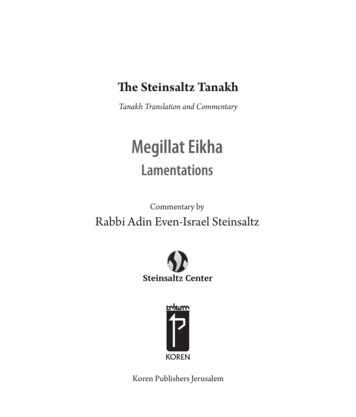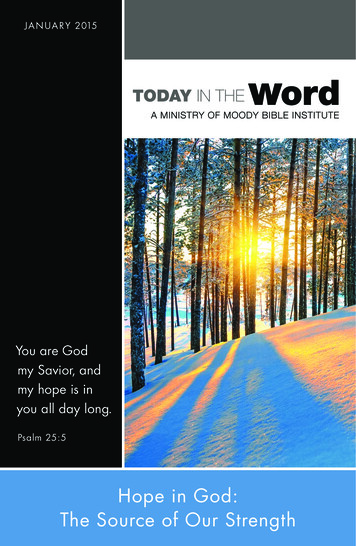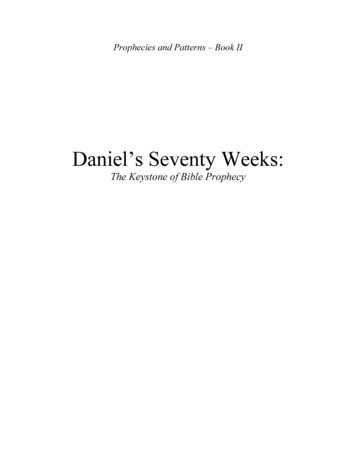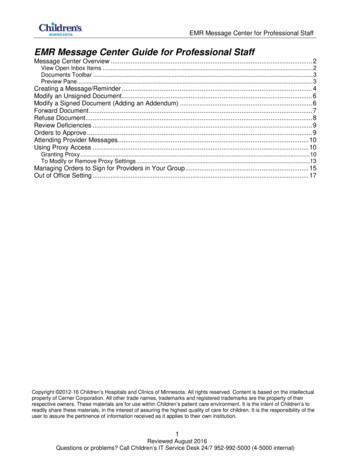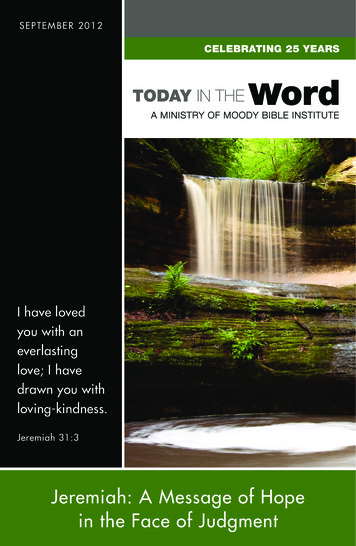
Transcription
SEPTEMBER 2012CELEBRATING 25 YEARSI have lovedyou with aneverlastinglove; I havedrawn you withloving-kindness.Jeremiah 31:3Jeremiah: A Message of Hopein the Face of Judgment
TODAY WITH PAUL NYQUISTPresident of Moody Bible InstituteLearning from JudahImagine that the Lordwas to visit your towntoday in search of menand women who arehonest and truthful.How many peoplewould He find? Wouldyou be one of them?This is exactly what the people of Jerusalemexperienced as recorded in the book of Jeremiah. God was willing to forgive the entirecapital city if He could find just one honestperson who was seeking the truth, but Hefound no one (Jer. 5:1).The people of Jerusalem—and all of Judah—had turned away from the Lord. Their liveswere wracked with sin, and they were worshiping false gods (Jer. 11:13). Among thesegods was Baal, a god of the Canaanites (Jer.2:8). Baal worship often involved animal sacrifice and prostitution. In addition to Baal, thepeople worshipped Molech, a god who required the sacrifice of children (Jer. 32:35).In a tremendous expression of grace, the Lordsent the prophet Jeremiah to warn the peopleof the impending consequences of their sinand call them to repentance. Tragically, theywould not listen. For 40 years, Jeremiahprophesied, but the people would not repent.As a result, the Babylonians invaded Judahthree times, conquered Jerusalem, destroyedthe temple, and captured the people of Judah.Despite the heroic example of Jeremiah’sobedience and God’s promise of future restoration (Jer. 30:3), the book of Jeremiah is a1-800-356-6639heartbreaking account of rebellion and thepainful consequences of sin. Why didn’t thepeople of Judah repent? How did they missdecades of warnings from God’s prophet?I’ve often told my children that it’s easier tolearn from the mistakes of others than to learnfrom the painful consequences of our ownmistakes. As we study the book of Jeremiah, Iwant us to learn from two key mistakes madeby the people of Judah that contributed totheir downfall.First, though they tried to appear godly on theoutside, on the inside their hearts were corrupt. They continued to visit the Lord in thetemple (Jer. 7:9–11), but in reality, their heartswere far from Him. They mistakenly thoughttheir worship rituals would give them favor inthe eyes of the Lord.Second, the people of Judah ignored godlycounsel. Because of their stubborn, hardhearts, they refused to listen to Jeremiah’swarnings (Jer. 5:3). Jeremiah wrote about thisfoolishness when he described them as people “who have eyes but do not see, who haveears but do not hear” (Jer. 5:21).Are we trying in vain to cover the sin in ourhearts by following a religious routine? Dowe humbly listen to the people God has put inour lives to speak truth to us? I challenge us tolearn from Judah’s mistakes by examiningour hearts and repenting of the sin in ourlives, so that we can be right with the Lord.May God find us to be honest people whoare seeking His truth.
THEOLOGY MATTERSby John KoesslerThe Wrath of GodIt is rare today to hear a sermon that focuseson the wrath of God. Some may even thinkthat the very idea of anger is incompatiblewith the gospel’s message of God’s mercyand grace. Yet one theme in the book of Jeremiah deals with the real threat posed bythe wrath of God. For example, in Jeremiah4:4 the Lord warned His people: “Circumcise yourselves to the LORD, circumcise yourhearts, you people of Judah and inhabitantsof Jerusalem, or my wrath will flare up andburn like fire because of the evil you havedone—burn with no one to quench it.”The Hebrew noun that is translated “wrath”is derived from a verb that means, “to behot.” The imagery of heat often appearswith statements that speak of God’s wrath.The impression left by this language is terrifying. It is meant to be. Elsewhere the Scriptures warn: “It is a dreadful thing to fall intothe hands of the living God” (Heb. 10:31).This is because God in His wrath is “a consuming fire” (Deut. 4:24; Heb. 12:29).God’s wrath is a reflection of His justice. It isdirected toward those who do evil. Unlikeour anger, which is affected by our sinfulnature, divine anger is motivated by righteousness (James 1:20). In his book Knowing God, theologian J. I. Packer points outthat the wrath of God, unlike human anger,is never capricious, self-indulgent, or irritable. “It is, instead, a right and necessaryreaction to objective moral evil. . . . God isonly angry where anger is called for.”Believers and unbelievers alike have an intuitive sense of God’s wrath, though not everyone will admit that this is their experience. This inner awareness of God’sdispleasure with sin is part of God’s generalrevelation of Himself to all humanity. But it isalso an aspect of the divine nature that sinfulhumanity suppresses (Rom. 1:18–19). Onereason we are uncomfortable with the ideaof divine wrath is because our fallen naturetends to live in denial of God’s righteous nature and His wrath.God’s capacity to experience and expresswrath cannot be separated from His otherattributes of love and mercy or His propensity to show grace. To do so would compartmentalize His nature in an incoherent way.God does not have a split personality. Hisrighteous anger is in harmony with Hisgrace. Nowhere is this more evident than inthe person and work of Jesus Christ, whobore our sins in His body on the cross anddelivered us from the wrath to come (1 Peter2:24; 1 Thess. 1:10).For Further StudyTo learn more about this subject read the chapter entitled, “The Wrath of God,” inKnowing God by J. I. Packer (InterVarsity).www.todayintheword.com
FROM THE EDITORSby Elena MafterToday in the Word’s MailbagDear friends,Your friendship, partnership, and prayer support are important to us. More thanthat, the ministry of Today in the Word would not exist without you, our readers. Thismonth, we would like to thank you for your letters, notes, phone calls, and e-mails—a testimony to what God is doing in your life through Today in the Word. Here is aselection of letters and e-mails you have written to us lately. Thank you for keepingin touch!I was born with a mental disability whichled to sin, rebellion, and mental illness. Inever knew what love was. But throughcounsel, medication, reading God’s Word,Our Daily Bread, and Today in the Word formany years, I slowly came to realize thelove of God and His care and compassionfor me. Thank you so much for Today in theWord. Through its words and teaching, Ihave learned the love of Jesus, and I personally want to thank you from the depths of mysoul. You have been a part of lifting me fromdeep darkness to the light. May the Lord Jesus Christ be praised!—Arlene, ILI have been reading Today in the Wordsince 2005, and I thank God for all of youevery day. This devotional has inspired meto stay in God’s Word every day and hashelped me to understand the Bible better. Ilove the “Q&A” section. I never would havethought to ask the meaning of hallelujah.Being reminded of its true definition makesit so much more meaningful when I sing it orsay it. The application section is so helpfuland needed for my daily life. Thank you somuch for every section of this precious book.I would not change a thing. I thank God forthe technology that allows me to read myToday in the Word [online]. May God continue to richly bless you.—Marilyn (via e-mail)Thank you for this monthly magazine. Mydaughter started me on it, and I’m glad tosay that my niece is now also reading it. I’m84 years old and I’m always learning.—Dorothy, ILI have been reading Today in the Word forover 20 years now. I’ve enjoyed beingblessed each month by your excellent studies. Recently I moved to London where Icouldn’t get the monthly booklet in time.Even the daily e-mail didn’t arrive earlyenough for my morning devotions. The discovery of your great website has fulfilled myneeds. I go to the website for my daily studyand also print out the monthly study in PDFfor those times I may be unable to access theInternet. I thank God for how He has grownand blessed me through your ministry.—Marcus (via e-mail)Continued on page 381-800-356-6639
VOLUME 25 ISSUE 9EXECUTIVE EDITORPaul B. CurrieMANAGING EDITORHeather MoffittASSOCIATE EDITORElena MafterJeremiah: A Message of Hopein the Face of JudgmentCONTRIBUTING EDITORSJohn KoesslerKim PickettWRITERBryan Stewart1-800-DL MOODY(356-6639)www.moodyministries.netPRESIDENTJ. Paul NyquistPROVOSTJunias VenugopalEXECUTIVE VICE PRESIDENTAND CHIEF OPERATINGOFFICERSteven MogckSENIOR VICE PRESIDENTGreg R. ThorntonCHIEF FINANCIAL OFFICERKen HeulittVICE PRESIDENTSElizabeth BrownLarry DavidhizarLloyd R. DodsonJim ElliottChristine GorzJohn A. JelinekCollin G. LambertFrank W. Leber Jr.Thomas A. ShawTRUSTEE CHAIRMANJerry B. JenkinsJeremiah had a choice: go to Babylon to live in exileor stay in Jerusalem. He chose the latter—and the personal courage of this “weeping prophet” is a wonderfulexample to Christians in today’s world where the socalled Babylons beckon. Jeremiah remained faithful tothe end in proclaiming truth to God’s people—despiteimprisonment, abduction, and fierce opposition to hismessage.This month in Today in the Word, we’ll take anotherlook at the words of the prophet. We will examine thenature and the purpose of his call, we’ll study his warnings to the backslidden Judah, and we’ll marvel onceagain at “how wide and long and high and deep” isthe love of God. We’ll find courage in the message ofhope: God’s love and His presence with His people.We hope that our study this month will strengthen yourresolve to stay faithful to the end, to finish the race nomatter what. There is comfort in knowing that we arenot alone in this race. There is comfort for all of us atToday in the Word that we are part of the Today in theWord family—a community of believers studying theBible together. Thank you for being part of that community. Thank you for your faithfulness. May the hopeof Jeremiah’s words strengthen your faith and encourage you!TRUSTEESChristopher DenisonT. Randall FairfaxThomas S. FortsonJ. Paul NyquistBervin C. PetersonDavid SchipperPaul Von TobelMark WagnerRichard YookTRUSTEE EMERITUSPaul JohnsonMoody Bible Institute is the sole publisher of Today in the Word, copyright 2012 by Moody Bible Institute. All rights reserved. Please direct all Todayin the Word inquiries to Donor Resource Management, 820 N. LaSalle Blvd.,Chicago, IL 60610. Scripture taken from the Holy Bible, New InternationalVersion , NIV Copyright 1973, 1978, 1984, 2011 by Biblica, Inc. TMUsed by permission. All rights reserved worldwide. Scripture taken fromthe New American Standard Bible , Copyright 1960, 1962, 1963, 1968,1971, 1972, 1973, 1975, 1977, 1995 by The Lockman Foundation. Used bypermission. Printed in the U.S.A. Today in the Word is published monthly.Printed on 30% recycled paper.www.todayintheword.com
Read: Jeremiah 1:1–19Saturday, September 1The Prophet’s CallPsychologists tell us that we can determine a lot about someone on our firstencounter—if we know how to readthe signs. Body language, facial expressions, and first words can communicatean abundance of information to thoselooking for it.disobedience. He was prepared for thismoment long before Jeremiah was born(v. 5).Out of this call, we discover twoimportant themes of the book. First, thereis the prominent theme of judgmentthat is coming upon JuThe first words of thedah. They have forsakenbook of Jeremiah arethe Lord and turned toI am watching torevealing as well. We areworship other gods. Likesee that my wordintroduced to the propheta boiling pot, destrucJeremiah, whose ministrytion will come from theis fulfilled.runs from “the thirteenthnorth. This is the messageJeremiah 1:12year of the reign ofJeremiah must deliver,Josiah . . . down to theand one of the recurring. . . eleventh year ofmotifs of the book.Zedekiah” (vv. 2–3). Why are wegiven this background reference? A Second, however, we see the promisequick look at 2 Chronicles 34 through of God to Jeremiah. Despite the harsh36 reveals the history of Judah’s down- message the prophet must deliver, Godward spiral from Josiah’s religious promises to give him the words to sayreforms to Judah’s exile at the hand of and His presence as protection. Not onlyBabylon. And it is precisely during the is God’s word against Judah trustworhistory of Judah’s fall into wickedness thy, but His promise to Jeremiah is surethat God proves His faithfulness by as well. The Lord is “watching to seecalling Jeremiah as prophet. God does that my word is fulfilled” (v. 12). This isnot give up on His people, even in their the character of our God.Apply the WordPray with UsAs you embark on your own encounter withthe book of Jeremiah, pray that God wouldopen your heart to see and receive what Hewants to teach you. Despite the unpopularthemes of destruction and judgment throughoutthe book, we can learn much about thecharacter of our God in this study. Pray for theSpirit’s guidance as you go forth.Join us in lifting up Moody’sBoard of Trustees. These 11 mengive of their time, expertise,and talents to support the workGod is doing through Moody’seducation and media ministries.Ask the Father to give thetrustees wisdom and unity asthey serve Him together.6 Moody Bible Institute
Read: Jeremiah 2:1–22Sunday, September 2Israel’s Betrayal[Optional longer reading: Jeremiah 2:1–4:4]holy, and defiled it (vv. 2–3). Althoughthere was no fault in God, Israel chose“worthless idols and became worthlessthemselves” (v. 5). Perhaps worst of all,the leaders of Israel (priests, rulers, andprophets), led the people into unfaithfulness (v. 8). Sin takes good and pervertsit into something else.Dale Carnegie, the author of How toWin Friends and Influence People, wouldlikely have given a failing grade to Jeremiah. His first message was harsh, accusing Judah of idolatry and unfaithfulness toward God. Verses14 through 22 summarizeThey havethe state of things: IsraelSecond, we see the inhas broken their yoke,gratitude of sin. Despiteforsaken me,torn off their bonds, andGod’s generous gifts of athe spring ofrejected serving the Lord.fertile land and abundantliving water.They are described with aprovisions, Israel repaidJeremiah 2:13variety of word pictures:such kindness with the deas prostitutes, an intracfilement of idolatry. Sintable vineyard, and dirtyso often stems from suchbathers unable to be cleansed. In the ingratitude toward God.face of inevitable consequences, Godreminds them “how evil and bitter it is” Finally, we are shown the sheer lunacyto forsake the Lord (v. 19).of sin. Astonishingly, Israel had takenits glorious God, who bestows livingAlong with the summary of Israel’s be- waters, and exchanged Him for worthtrayal, today’s reading also paints a less idols and “broken cisterns thatportrait of the characteristics of sin. cannot hold water” (v. 13). Who in theirFirst, sin is a perversion. Like a youthful right mind would choose stale, contamibride once devoted to her husband, Is- nated water over fresh springs? Yet thisrael has perverted all that was good and is precisely the lunacy of sin.Apply the WordPray with UsToday’s reading calls us to take a hard lookinto our own lives. How might we, too, beguilty of forsaking God? How is the perversion, ingratitude, and lunacy of sin taking rootand leading us to forsake the One who firstloved us? Ask God for the courage to makean honest examination of your life and seekrepentance where needed.Please pray for Dr. JuniasVenugopal, Provost and Deanof Education, as well as hisExecutive AdministrativeAssistant, Denise Kuypers.Praise God for their service tomore than 3,000 students whoreceive quality Christianministry training.Today in the Word 7
Read: Jeremiah 4:5–31Monday, September 3Judgment from the North[Optional longer reading: Jer. 4:5–6:30]God’s punishment. The battle cry warnsof “terrible destruction” (v. 6). Like a lion,Except for Egypt on its southern bor- the northern invader will wreak havocder, any nation wishing to attack Israel and leave Israel’s leaders appalled andwould have come from the north. Even terrified. In imagery suggestive of a renations in the east would have moved versal of the Genesis creation account,north to avoid the trek across the east- Jeremiah depicts a barren wasteland: “Ilooked at the earth and itern wilderness. It is nowas formless and empty”surprise that Jeremiah’s(v. 23). Verse 19 epitoword warns of the comJerusalem, washmizes the coming tormenting destruction from thethe evil fromas a voice cries out, “Oh,north. What do Jeremiyour heart andmy anguish, my anguish! Iah’s oracles tell us aboutbe saved.writhe in pain.”this impending disaster?Jeremiah 4:14Although there is a humanagent, the real sourceof the coming destruction is God. TheLord’s anger over Israel’s idolatry hadnot been turned away. Like a scorching desert wind, God was sending Hisjudgment against His rebellious people.The reason for such devastation is clear:Israel’s own wicked conduct had broughtthis punishment upon them (v. 18).The bulk of the chapter, however,details a vivid and horrific imagery ofThe scene in today’sreading is truly dreadful,something akin to nuclear fallout whereall life is decimated. And yet, even inthe horrific face of impending judgment,don’t miss the glimmers of hope offered.With the right response there may bemercy. God calls them to “wash the evilfrom your heart and be saved” (v. 14).Later, God declares His mercy again,saying, “I will not destroy it completely” (v. 27). Even here the mercy of Godpeeks through.Apply the WordPray with UsToday’s pictures of God’s wrath and mercyboth reflect His commitment to His people. Hiswrath demonstrates the seriousness of Hisrelationship with us and how sin severs it. Hismercy indicates His commitment to grace evenin the face of foolish disobedience. Givethanks today that God considers His relationship with us something worth taking seriously.More than 40,000 Moodyalumni are serving Christ inover 100 countries. Pray forMissions department faculty—Walter Cirafesi, Stephen Clark,and Clive Craigen—as theyequip the next generation atMoody’s undergraduate schoolin Chicago.8 Moody Bible Institute
Read: Jeremiah 7:1–29Tuesday, September 4Jeremiah’s Temple SermonNumerous polls and surveys indicate Lord” (v. 4). Jeremiah’s history lessonthat for the majority of people, public about Shiloh reminded Israel that thespeaking ranks as our greatest fear, place of God’s presence was no proteceven higher than death. If public speak- tion for those who remain in their sin.ing produces such anxiety, imaginebeing called to deliver a harsh spiri- Jeremiah likewise identified the sintual message to a crowd of people at of God’s people in specific terms.a religious center. ThatThey had failed to bringwas precisely the taskjustice to the alien andto which God calledinnocent and violated theAre they notJeremiah, to stand in theexplicit commandments ofrather harmingtemple and deliver a mesGod. Most central to theirthemselves, tosage about Israel’s sin.failings, however, wastheir own shame?their idolatry and lackOne aspect of Jeremiah’sof repentance. NoticeJeremiah 7:19temple sermon highlightsthat the sin of idolatry, inthe hypocrisy and selfparticular, does not justdelusion of Israel. Though engaged in provoke God, but harms themselves asall variety of sin, the people continued well. As God says, “They are harmingto return to the place of worship as if themselves, to their own shame” (v. 19).nothing was wrong. Indeed, they ran to Likewise, God had given His commands,the temple as a “den of robbers” (v. 11), “that it may go well with you” (v. 23).deluding themselves into thinking that Serving and obeying the Lord is not atGod would never destroy the very place all like serving a cruel tyrant. Rather,of His presence. As hypocrites and self- God’s commands are for our own good,deceived, they chanted their mantra, and our obedience brings blessing and“the temple of the Lord, the temple of the true satisfaction in our lives.Apply the WordPray with UsConsider today Scripture’s way of looking atsin. Our disobedience is a fundamental denialof God’s blessing intended for us. Without aproperly obedient relationship with Him, wemiss the best that God has for us. Identify onething in your life that is falling short of the bestGod intends for you; then do what Israel didnot—repent and seek God’s forgiveness.Continuing our prayers forfaculty serving in the Missionsdepartment at Moody’sChicago campus, please bringbefore the Lord ElizabethLightbody, Michael Rydelnik,and Timothy Sisk. Thank Godfor their commitment tocross-cultural ministry.Today in the Word 9
Read: Jeremiah 8:4–17; 10:1–16Wednesday, September 5Impenitence and Idolatry[Optional longer reading: Jer. 8:4–10:25]wisdom means knowing God’s wordand following it.Our key verse today speaks of the follyof refusing correction. The first part The second part of today’s readingof today’s reading echoes this same focuses on the sin of idolatry. The conidea as God described the stiff-necked trast between idols and God is clear. Inbehavior of Israel. They “refuse to a very real sense, there is an absurdityreturn” (8:5) and “noneabout idolatry. Idols areof them repent of theirinanimate objects, carvedwickedness” (8:6). In fact,from wood or stone,Whoever remainsthey show no remorseadorned by craftsmen,stiff-necked afteror hesitation about sin atand carried about. Notmany rebukesall. Even the birds haveonly can they not speakwill suddenlyenough sense to knowor walk, they are utterlywhen to migrate, but theuseless: “they can do nobe destroyed.people of Judah lack allharm, nor can they do anyProverbs 29:1knowledge of God.good” (10:5).The scribes of the law andthe leaders of Israel claimed wisdom,but God revealed their folly. Wherethings were serious, Israel’s leaderstreated the matter lightly. Where therewas coming judgment, their false prophets proclaimed peace. God’s opinionwas clear: “Since they have rejectedthe word of the Lord, what kind ofwisdom do they have?” (8:9). TrueThe Lord, on the otherhand, as the only true God, is uniquely superior. No one is like Him. He is“mighty in power” (10:6), the “livingGod, the eternal King” (10:10). Andunlike the worthless idols, He is thecreator and Lord of all things. Theworship of idols, then, is not only sinful,but absurd. And yet, Israel persisted intheir sin.Apply the WordPray with UsWe might laugh at Jeremiah’s depiction ofidols until we recognize that modern-dayidolatry is alive and well. Our idols mayinclude Hollywood’s ideas about beauty, timewasted on the Internet, our job, or anythingthat turns us from God. What things in yourlife might be idols? Confess, and ask God tobecome the center of your attention again.Your prayers will be anencouragement to ElizabethBrown, Vice President andGeneral Counsel. Ask the Lordto grant Elizabeth discernmentand insight as she provideslegal counsel to Moody’sministries throughout the year.10 Moody Bible Institute
Read: Jeremiah 11:1–23Thursday, September 6Broken Covenant[Optional longer reading: Jer. 11:1–12:17]the stubbornness of their evil hearts” (v.8). The people worshiped other gods;the covenant had been broken.In the ancient Near East, powerful kingswould often form treaties with theirsubjects by making covenants with them. As a result God reminded them of theBoth king and vassal would swear an curses specified in the original covenant.oath whereby the king promised his pro- The people’s sin was so egregious thattection and blessing andGod gave them over tothe vassal promised histheir false gods. Whenservice and obedience.disaster would come, IsObey me . . . andBreaking the covenantrael could turn to themyou will be myoath was a serious viofor help—help that wouldpeople, and I willlation resulting in cursesnever arrive. The Lordbe your God.specified in the treaty.even instructed Jeremiahnot to pray for the peoJeremiah 11:4The theme of God’s covple, underscoring God’senantal relationship withjudgment on their covIsrael, and Israel’s violation of their end enantal violation.of the covenant, lies at the heart of thebook of Jeremiah. God had graciously One might think that in response to direscued Israel from the oppression of vine rebuke and warning, the peopleEgyptian slavery and formed a binding would turn to God in repentance. Incovenant. The terms were simple: “Obey stead, the men of Anathoth, Jeremiah’sme . . . and you will be my people, and I hometown, plotted to kill the prophetwill be your God” (v. 4). Unfortunately, who delivered God’s message. In theGod’s people refused to uphold their end, God’s last word highlights theend of the covenant: “they did not listen hardness of their hearts and seals theiror pay attention; instead, they followed judgment for covenant unfaithfulness.Apply the WordPray with UsWhen someone points out our failings anddisobedience, we often become angry insteadof heeding the admonition that can restore ourrelationship with God. Think of someone inyour life who, perhaps like Jeremiah, helpedyou see your own sin. Thank God for Hisgrace in sending that person to you. Then taketime also to thank the person whom God used.Give thanks to God for theLegal department: Emmy Koh,Cassandrea Blakely, NatalieHarper, and Hannah Roos. Thisteam helps Moody’s ministrypartners in establishing willsand trusts and also provideslegal assistance to Moody’sministries.Today in the Word 11
Read: Jeremiah 13:1–27Friday, September 7Prospect of ExileWe’ve all heard the adage that actionsspeak louder than words, or a pictureis worth a thousand words. Sometimeswords alone do not convince as well asactions. In the case of Jeremiah, Godchose a similar course by having Jeremiah enact a kind of living parable.has the effect of ruining our relationshipwith God.Even so, Jeremiah offered yet againa call to do what was right—to payattention to the word of the Lord, and togive Him the glory due His name. Timewas running out, and iftheir pride and arrogancecontinued to prevent their“‘Why hasrepentance, captivity andthis happenedexile were the comingto me?’—it isjudgment. Royalty wouldbecause of yourlose their thrones andcrowns, supposed alliesmany sins.”would betray them, andJeremiah 13:22“all Judah will be carriedinto exile” (v. 19).God instructed Jeremiahto buy a new linen cloth,a kind of undergarmentworn close to the skin,waist to knees. Over along period of unspecified days, Jeremiah wasto wear it without washing, then hide it in a rockycrevice, and then dig itup again. By the end, thelinen cloth had become dirty, ruined,and useless. All of this was to symbolize God’s intimate relationship withJudah that over time had become sulliedand ruined. As a result, the Lord evokedanother image, this time of wineskinsand drunkenness, to depict the ruin anddestruction coming upon His people. SinIn the face of such coming disaster, anatural question might be: why is thishappening? The answer is clear: it wasbecause of Judah’s stubbornness in sin.So accustomed were they to their sinfulhabits that they were as likely to repentand do good as an Ethiopian or a leopard would be able to change their skin.This is the dark danger of habitual sin.Apply the WordPray with UsSo much in the early chapters in Jeremiahrevolves around God’s call to repentanceover sin. Is there someone in your life whoneeds a firm, but gentle, exhortation to turnfrom sin before an intractable habit sets in?Ask God today for the wisdom and courageto speak in love to this person that they mightturn to God and live.We have the privilege ofpraying for Moody’sundergraduate and seminarystudents studying at ourcampuses in Chicago, Illinois;Spokane, Washington; andPlymouth, Michigan. May Godgive them thirst for His Word,and passion for their studies.12 Moody Bible Institute
Read: Jeremiah 14:1–12; 16:10–21Saturday, September 8Drought, Famine, Disaster[Optional longer reading: Jer. 14:1–17:4]Most teachers would agree with theold Latin saying, Repetitio est mater studiorum, which means, “Repetition is themother of learning.” It usually takes repetition before a lesson will stick.false gods all day long, this time in aforeign land. It would seem that Judah’ssin had reached a climactic point of noreturn. God’s mercy was exhausted.Or was it? Just when it seemed all hopewas gone, we find within this dark message a new theme: grace.God did the same for HisBriefly, but clearly, GodDo not lose heartpeople through Jeremiah.hinted that after thewhen he rebukesOnce again in today’simminentpunishment,passages, we are metthere would be a day ofyou, because thewith the familiar themerestoration to their landLord disciplinesof rebuke over sin and(16:14–15). Just as Godthe one he loves.warning of judgment. Likeonce brought Israel out ofHebrews 12:5–6their forefathers, JudahEgypt, so again He wouldhad forsaken God, folbring them out of thelowed other gods, and remained in stub- hands of the northern oppressors.born disobedience. Even the prophet’splea for God’s mercy fell on deaf ears God’s grace is even bigger than that.(14:7–9). Jeremiah recognized Israel’s Not just would Israel be restored, butcovenant faithlessness, but nevertheless all nations “from the ends of the earth”turned to God, the “hope of Israel, its (16:19) would one day stream to the Lord,Savior in times of distress” (14:8). Yet in confess their idolatry, and be taught toresponse, God reminded them of their know the living God. How marvelousunrestrained sin and their coming judg- that such dark warnings of coming judgment. In chapter 16, God handed them ment could also contain such glimmeringover to what they wanted: to worship promises of abundant grace!Apply the WordPray with UsPraise God that we worship One who, even inHis discipline, does not abandon His grace tous! The author of Hebrews also reminds us ofthis lesson: “Do not lose heart when Herebukes you, because the Lord disciplines theone he loves” (12:5–6). Try committing theseverses to memory or write them down, to beremi
President of Moody Bible Institute Imagine that the Lord was to visit your town today in search of men . obedience and God’s promise of future resto-ration (Jer. 30:3), the book of Jeremiah is a . [online]. May
